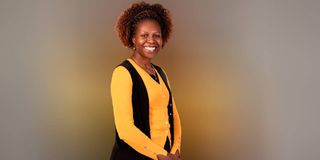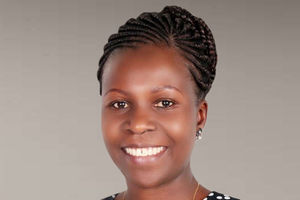
Salome Bukachi, an associate professor at the University of Nairobi’s Institute of Anthropology, Gender and African Studies.
Last year, Professor Salome Bukachi was named in the World Health Organisation’s (WHO) list of 28 international commissioners tasked with preventing the next pandemic. Salome is an associate professor at the University of Nairobi’s Institute of Anthropology, Gender and African Studies.
As commissioners, Prof Bukachi and her teammates will be tasked with mobilising decision-makers and implementers to take transdisciplinary action to limit viral spillovers.
Being named in the team was a major highlight for Prof Bukachi, the apex in a career path that has been far from a straight line. Since childhood, she always wanted to be a doctor.
“I loved taking care of people, and anytime somebody was sick, I was the one giving care or treating the wound,” she says.
In high school, she fell in love with biology and everything about that subject, especially the human body. But when she finished her Kenya Certificate of Secondary Education, Salome didn’t manage to get the right combination of subjects that would allow her to pursue a degree in medicine.
“Initially, I settled on doing a course in arts and humanities at The University of Nairobi. At the time, I didn’t even know what the course entailed. My parents kept asking me, ‘what is this anthropology? What are you going to become? Why don’t you do something like teaching, law, engineering or medicine?’ Their biggest worry was whether I would be able to get a job.”
Nonetheless, Salome continued with the little-known course, until things changed in her second year of studies.
“We were introduced to a unit called medical anthropology, which involves studying how health and illness are shaped, experienced, and understood in cultural, historical, and political contexts.” Due to her love for health matters, she knew she was in the right place.
In 1993, Prof Bukachi finally graduated, but soon, her parents’ fears were confirmed.
“I really struggled to get a job. I applied to various NGOs, but I didn’t get any feedback.” Salome decided to take part-time jobs tutoring primary school students and passing advertisement flyers in town. By then her father had begun persuading her to enrol for a Master’s degree.
“I had promised him that I would apply for Master’s, but inside I knew it wouldn’t happen if I didn’t get a scholarship.”
Being the second born in a family of 12, she felt she needed to give her parents space to pay fees for her other siblings.
“But my father insisted, and eventually I had to apply.”
She got accepted at UoN, but finances remained a challenge. After exploring several options, she organised a harambee, and in 1995 she began her Master’s course in anthropology, specialising in medical anthropology.
Three years later, Prof Bukachi graduated. At this point she had just gotten married, but even though she enjoyed marital bliss, she still couldn’t escape the reality of unemployment, as she struggled to find work.
She took part-time research jobs for a few months, until one day she came across an advertisement in the newspapers about a vacant position at the Kenya Trypanosomiasis Research Institute (KETRI).
She applied and got the job, and that’s how her career in research on infectious diseases kicked off. Even then, she had struggled with some insecurities on whether she deserved the job.
“At this point, I was expecting my first baby and some of my friends told me that no organisation likes employing expectant women because I would soon be going on leave.”
But this never came true. In 2000, she officially started working.
Her confidence and strong will were on display right from when she was a little girl. Her mother, she says, was her role model.
“She brought us up – all 12 of us – while at the same time managing our sugarcane plantation. This is where I got the diligence and work ethics from.”
Her father, apart from being very instrumental in ensuring Prof Bukachi and her siblings attained the highest level of education, treated all his children equally, without considering gender. Her husband has also played a crucial role in shaping her career.
“I remember when I was writing my PhD thesis, I had just given birth to our second child. I told him that I needed time alone, perhaps staying at a hotel for a week, so I could complete my thesis. He didn’t agree to it, but instead opted to be taking the children out of the house every day, for seven days.”
Within a week, she had completed her dissertation. But even with this strong support system, Prof Bukachi says her life as a career woman has been nothing short of demanding.
“It is not easy for a woman to blend career and family life. It takes a lot because you do your job, and afterwards, home affairs are waiting.”
At times she was forced to carry her children along to her field activities, not just for them to see and appreciate the work that she does, but also so they could experience the different places she visited.
She also travels with her husband at times, which gives them an opportunity to be together while on the move.
Prof Bukachi advises women in the science space not to allow themselves to be intimidated by the men who dominate that field.
“You have what it takes to excel in this space, just like the men. Be diligent at what you do and do not despise small beginnings. Give it your best shot and God will help you in all you do.”






